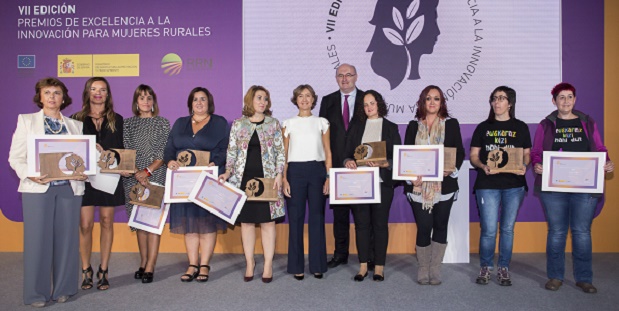
19 de October de 2016
The 2016 Excellence in Innovation Awards were presented to eight projects by women from the autonomous communities of Andalusia, Asturias, Cantabria, Castilla-La Mancha, Castilla y León, Navarra, and the Valencian Community.
10/19/2016
These awards recognize original and innovative projects by rural women, based on agricultural, agri-food, and complementary and diversified activities, which promote women's entrepreneurship and employment in the region.
In its 7th edition, the award-winning women received their prizes from Minister Isabel García Tejerina and the European Union Commissioner for Agriculture and Rural Development, Phil Hogan, at the Ministry's headquarters on October 13.
Four projects were awarded in the Excellence in Innovation in Agricultural Activity category: "Justina de Liébana" from Santander, "Innovation and Implementation of New Crops" from Huelva, "Masía Ana. Intergenerational Agroecology" from Castellón, and "El Kirinal Ecologico" from Albacete.
“Justina de Liébana” is a Santander company founded by a rural woman and now managed by her daughter. It is dedicated to the production of organic pomace and liqueurs, with its own vineyards and distillery.
They launched a powerful marketing campaign, with a more modern and attractive design, demonstration workshops at food fairs, and appearances in food magazines and journals.
“Innovation and Implementation of New Crops” is a project based on the cultivation of a new species in the province of Huelva: the Sharoni persimmon.
Grupo Medina, a leading family business in the Andalusian agri-food sector and a driving force behind the strawberry industry in Huelva, introduced the Sharoni persimmon in the late 1980s. With a significant investment in R&D, it has become a benchmark in the cultivation of this variety, thus diversifying the crop. Today, it is a world leader in persimmon production and its products are exported to five continents.
For its part, "Masía Ana. Intergenerational Agroecology," run by women in Castellón, carries out organic agricultural production and initiatives to recover native varieties, promoting and training in organic farming.
The project offers an innovative approach to the citrus sector, recovering local varieties, promoting their conservation, improving their yield, and providing an environmentally friendly approach.
In Albacete, "El Kirinal Ecológico" is based on the establishment of an organic free-range egg farm in Ayna, complementing the agricultural activity of growing organic extra virgin olive oil.
The organic production of free-range eggs and olive oil has been accompanied by marketing initiatives and the design of a corporate image. The farm operates with responsible use of energy and natural resources, respecting biodiversity and ecological balance, and protecting soil fertility and water quality.
These are projects based on sustainable agricultural and livestock activities, efficient in producing quality products that meet consumer demand and integrate marketing and promotion strategies.
Four other projects have received awards in the category of "Excellence for Innovation in the Diversification of Economic Activity in Rural Areas."
“Save the Guirra Sheep” in Ayora, Valencia, is an initiative driven by a woman to save the native Valencian breed of guirra sheep, which is in danger of extinction and in a practically abandoned area.
The project's objective is to break the inbreeding lines of sheep, study the racial prototype and zoometric parameters, viability, and production index, create the AGUIRRA association (Association of Valencian Breeders of the Guirra Breed), determine it as a non-valine breed, obtain the quality mark, and create the Association of Valencian Breeders of Pasture Lamb.
In Sotres, Asturias, the "Cabriales Cheese Classroom" is another award-winning project. It focuses on the creation of an innovative company for the production of Cabrales cheese, based on the experience of a small, traditional family business. It also develops activities such as the "Cabrales Cheese Classroom," where a space has been created for guided tours.
Thanks to the complementary outreach activities it carries out, the cheese factory serves as an example of entrepreneurship for women and young people in rural areas, thus demonstrating the possibilities for job creation through generational renewal.
For its part, "La exclusiva. Logística local" in Soria represents a shift from a business model to a system of social innovation, which seeks to meet basic social needs in the rural areas of the province of Soria.
Based on identified needs, home delivery of agricultural products and services is carried out in underpopulated areas of Soria, serving approximately 3,000 families. At no additional cost to the beneficiaries, the providers cover the cost with a percentage of the sales volume. The new social logistics business model helps to retain the population in sensitive areas.
The Navarrese social initiative cooperative "Ernaizu S. Coop" has received the award for creating jobs and providing services in the Basaburua Valley, as well as being a driving force for economic development that respects the environment and the valley's culture.
The project seeks to promote the valley's socioeconomic and engodenal development, improve services, and promote social cohesion and the valley's dynamics through job creation and work-life balance. To this end, the project develops activities, including the creation and management of the Orokieta shop-bar and inn.
All of these projects meet the objective of diversifying economic activity in rural areas through complementary activities, including agricultural and food production, local resources, and traditional aspects of agricultural and agri-food activity, which foster new economic sectors or generate employment in rural areas.
The Ministry has been presenting these awards since their first edition in 2010 as a means of promoting outstanding projects developed by rural women. They also aim to encourage the active participation of associations and representative organizations related to rural women.











